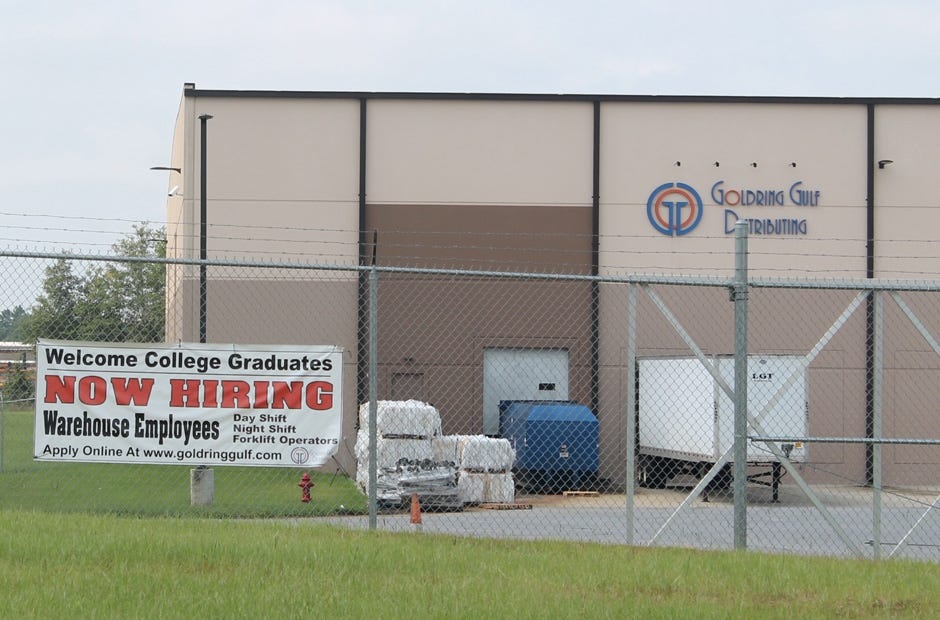![A banner at Goldring Gulf Distributing suggests the company is offering entry-level jobs to college graduates. A company spokesperson verified this, saying some college graduates can't find their ideal jobs directly out of school, so they offer positions like warehouse employee as a starting point. [AARON LITTLE | Press Gazette]](http://127.0.0.1/wordpress/wp-content/uploads/2022/01/ghows-DA-571315db-f74b-04fa-e053-0100007f7ff1-0ff4d4e2.jpeg)
MILTON — The Federal Reserve Bank of New York finds that students who major in treatment therapy, family and consumer sciences, general social sciences, anthropology, fine arts, early childhood education, performing arts, social services and theology earn $30,000 or less early in their careers.
Between 22.8 percent and 65 percent of these students also face underemployment.
Underemployment refers to workers who are highly skilled but working low-paying or low-skill jobs, according to the financial education website Investopedia.com. The Federal Reserve describes underemployment as jobs not requiring a college degree.
Engineering majors tend to become engineers and nursing majors tend to become nurses, according to the Federal Reserve. Though they tend to earn more than the nine majors here at $34,500 to start, criminal justice majors have the highest unemployment rate at 75.3 percent. Almost half of theology majors don’t work in their fields of study and have the lowest starting salaries at $27,000.
Companies are taking advantage of the situation, offering entry-level work to university degree-holders.
Testing the job climate
A banner at Goldring Gulf Distributing Company reads, “Welcome College Graduates — NOW HIRING Warehouse Employees, Day Shift, Night Shift, Forklift Operators.”
The company clarified any confusion on whether it’s offering warehouse jobs to college graduates.
“The reason we made this sign is, yes, we are absolutely accepting applications from college graduates for warehouse positions,” managing director of marketing Amy Baldwin said.
The company bases the offer on the job climate for college graduates.
“We know that during the summer many young people are graduating from college and looking to take a step into a career with a successful organization,” Baldwin said. “The unfortunate truth is more and more graduates are finding out there is not always that perfect dream job waiting for them when they exit college.”
Gaining skills in retail
While some majors don’t lead to careers in the same field or earning a $100,000 salary, the degree is still worth pursuing, Santa Rosa County Economic Development Director Shannon Ogletree says.
“At least going to college shows you’re trainable … It shows a willingness to go forward. We’re all required to go to high school, but Goldring may want that extra drive.”
Starting at the bottom may not be so bad, either, he said.
“You’ve got to work yourself up. School is one thing but hard work is something else. I try to instill (that) in my kids. I know plenty smart people, more than me, but have no initiative. I think starting off in those basic jobs — almost everyone needs to work retail or fast food to see what it’s really like to provide customer service; to see what the world is really like.”
The importance of internships
So what should new college students do, change majors?
The University of West Florida suggests looking into internships.
“University of West Florida Career Services strongly encourages our students to engage in high-impact practices such as internships or cooperative education (CoOp) prior to graduation so they are able to position themselves to be competitive for roles beyond the entry-level,” UWF Career Services Associate Director Lindsey Walk said.
“As reported by (the National Association of Colleges and Employers) in the 2017 Internship & CoOp Report, the average conversion rate from intern to full-time hire was 51.3 percent in 2016 showing the value of participating in this high-impact practice.”
THE ISSUE: Not all college majors are equally attractive to potential employers, so students of nine majors earn $30,000 or less early in their careers and many experience 33 percent underemployment or higher.
LOCAL IMPACT: When these students graduate, they may have to start in jobs unrelated to their fields of study.
This article originally appeared on Santa Rosa Press Gazette: More college graduates face underemployment
